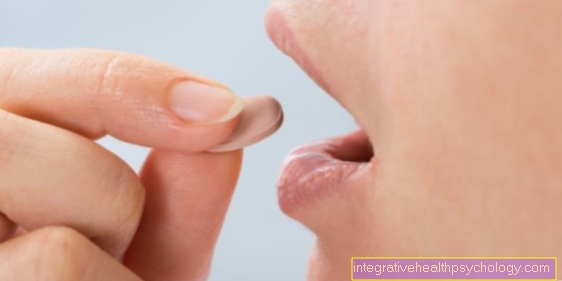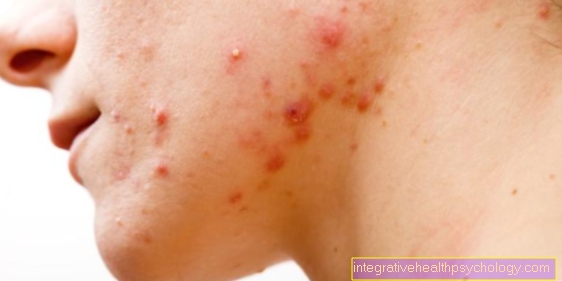Itchy eyes
What are itchy eyes?
Itchy eyes describe an unpleasant itchiness that can be accompanied by redness and pain. In addition, the eye may be swollen and watery. Other accompanying symptoms may include blurred vision or sensitivity to light.
The itching can be caused by various diseases. The most common triggers are conjunctivitis or allergic reactions. The therapy depends on the underlying disease. Usually the itching will go away after successful treatment.

The reasons
Often the cause of itchy eyes is an allergy, for example a pollen allergy or an allergy to animal hair. With the itching and tearing of the eye, the eye tries to flush the tiny allergens out of the eye and shows the body that something is “in the air”.
Another common cause of itchy eyes can be conjunctivitis. The itchy eye is also one of the typical symptoms here. A distinction is typically made in conjunctivitis between bacterial and viral conjunctivitis. This infection is transmitted very quickly as an infection to people who are already sick in the area. A foreign body or too much light (summer vacation without sunglasses!) Or drafts (air conditioning, wind) can lead to inflammation of the conjunctiva and thus cause the eyes to itch.
A rare cause of itchy eyes can be a mosquito bite in the region of the eye. Under no circumstances should you scratch or press here to prevent the swelling from spreading. The sting can be slightly cooled or carefully treated with aloe vera if it can be ruled out that any of it gets into the eye. If there is a large swelling, it must be ensured that it is treated properly and it makes sense to consult a doctor.
A stye can also cause itchy eyes.
The allergy as the cause
Itchy eyes can be caused by an allergy. Typical allergens here are pollen, animal hair or dust. But other allergens can also be the cause, especially if you have previously touched them with your hand and then touched your eyes. But how can an allergen cause itching?
An allergic reaction leads to sensitization to a certain substance. The immune defense recognizes this substance supposedly as harmful and fights it. This creates an inflammatory reaction - immune mediators (messenger substances) such as histamine are released. Histamine increases the permeability of blood vessels. The result is swelling, redness and itching. Exactly this mechanism also takes place in the eye. The body fights the allergen and also tries to eliminate the substance through increased tear production.
Furthermore, an allergy can cause a rash on the eyelids or the surrounding skin. In addition, the mucous membranes of the nose can also swell. Subjectively, one can develop the feeling of a stuffy nose. Both eyes are often affected by the allergic reaction.
If an allergy is suspected, a doctor should be consulted to initiate further diagnostic steps. Various test methods can identify the allergen. Specific therapy can also be initiated as required.
Learn more about the topic: The allergy.
The contact lenses as the cause
Contact lenses are common triggers for itching. When using contact lenses, it is important that they fit well. If this is not the case, it may cause irritation and itchy eyes. In the worst case, even the cornea can be injured. For this reason, it is advisable to buy the contact lenses only after consulting an optician.
In addition, wearing contact lenses all the time can dry out the eye. This can also trigger severe itching. Eye drops can provide relief. Contact lenses can also promote infections. Adequate hygiene should be ensured. Contact lenses should definitely be removed before going to bed. If you have not followed these rules and the eye is infected, you should consult an ophthalmologist.
The accompanying symptoms
Typical allergy symptoms are, in addition to the itchy eye, reddening of the eye, the urge to sneeze, shortness of breath and watery eyes. Other accompanying symptoms such as itchy skin etc. are also possible.
If there is conjunctivitis, redness and pain in the eye lead to a foreign body sensation and sensitivity to light in the affected eye, as well as increased tears or mucous secretions from the eye.
The burning eye
Depending on the underlying disease, different symptoms can be caused. These symptoms include a burning sensation in the eye. The burning sensation is usually caused by dehydration. Due to the reduced liquid film, movements of the eyeball can be perceived as painful. This manifests itself in the form of a burning sensation or stinging. An itchy and burning eye can also occur as part of an infection, especially conjunctivitis.
This symptom can also occur with an allergic reaction. Here, special messenger substances are released that lead to a sensitization of the nerve endings. Sensory stimuli can lead to an increased pain stimulus. This can take the form of a burning sensation in the eye.
The watery eye
A watery eye can be a concomitant symptom of various diseases. For example, an allergic reaction can lead to tears as the eye tries to eliminate the allergen in this way. The eyes can also tear more often during infections.
If a foreign body gets into the eye, it can cause itching as well as increased tear production. The eye tries to “rinse out” the foreign body through this mechanism. The eyes can dry out if the room air is dry or if the air is polluted. The tear secretion is increased reactively. Wearing contact lenses for too long can also lead to dehydration and cause tears. In this case, the use of eye drops is recommended.
The foreign body feeling
A foreign body sensation describes an unpleasant symptom. Those affected have the feeling that there is something in the eye that normally does not belong there. The combination of an itchy eye and a foreign body sensation usually occurs with infections. Quite often this is conjunctivitis, which can also lead to reddening and pain in the eye.
But an eye that is too dry can also cause a foreign body sensation, especially if you wear contact lenses. A reduced tear film makes the eye particularly sensitive and cannot tolerate the contact lenses. The contact lenses are perceived as foreign.
Find out more about the topic here: The contact lenses.
The sensitivity to light
If the eye is sensitive to light (so-called photophobia), it is extremely sensitive to light stimuli. Light stimuli, which normally do not cause discomfort, are now painful. The affected people avoid bright surroundings and prefer to retreat to dark rooms.
Photosensitivity can occur in various diseases. A classic example of this is migraines or macular degeneration, an age-related eye disease. However, an itchy eye and simultaneous sensitivity to light speak for a conjunctivitis (so-called conjunctivitis). The inflammation sensitizes the nerve endings, which increases the perception of stimuli. With successful conjunctivitis treatment, the symptoms go away quickly.
The reddened eye
An itchy eye that is also reddened is the main symptom of conjunctivitis. Conjunctivitis is usually caused by bacteria or viruses. The body's defenses try to fight the pathogens - as a result, inflammatory reactions develop. These reactions cause the blood vessels to widen. This makes the eye look red.
But an inflammatory reaction can also be triggered by an allergy. Another possible cause is a dry eye. The reduced tear fluid can lead to irritation which, over a period of time, causes inflammation.
Read more about the topic here: The conjunctivitis.
The pain
Pain is usually an accompanying symptom of an illness. They are caused by an inflammatory reaction. In this process, the body releases messenger substances that attract immune cells to the scene. However, some of these messenger substances also lead to a sensitization of nerve endings. This increases the perception of stimuli and can cause pain. The causative disease in the eye is usually conjunctivitis. It can cause severe pain, itching, and redness of the eye.
However, a foreign body that has got into the eye can also cause pain. In this case, however, the pain is caused by local irritation of the nerve endings by the foreign body.
The treatment
Treatment is directed to the underlying cause depending on the suspicion. If an allergy is suspected, an appropriate test for allergens can be carried out. The doctor can then prescribe appropriate medication. Eye drops and additional tablets can reduce the symptoms and, in some cases, can also be taken preventively to prevent the symptoms from recurring. If there is an allergy to animal hair, contact with the identified allergens can be avoided by avoiding the company of the relevant animals.
If there is conjunctivitis, the ophthalmologist can most reliably determine the cause of the inflammation by taking a swab from the conjunctiva of the eye. After a laboratory examination and determination of the exact pathogen, the doctor can then prescribe eye drops with active ingredients specifically against the cause of the conjunctivitis. In some cases an eye gel is more suitable than eye drops because it stays in the eye for a long time without being rinsed out too quickly.
Contact lenses must not be worn while conjunctivitis is present and the eyes should be protected from exposure to high light and strain. After a few days, the conjunctivitis will usually have subsided with the correct treatment.
Only viral conjunctivitis can sometimes require a very lengthy healing process.
Find out all about the topic here: The conjunctivitis.
Which home remedies can help?
Since an itchy eye is extremely uncomfortable, various home remedies can be used to relieve the symptoms. For example, an ice cube can be placed on the lid. The cold can reduce the itchiness. Alternatively, cold quark or yoghurt can be placed on a cloth. It has a soothing effect due to its cooling and anti-inflammatory effect.
Another effective home remedy is the aloe vera gel. Aloe Vera has a strong anti-inflammatory effect. As the inflammation subsides, so does the itchiness. When using it, you should make sure that the gel does not get into the eye, but is only applied to the eyelids. You can also boil chamomile flowers and dab the water on the skin with a cotton pad.
The duration
Unfortunately, no statement can be made about the duration of an itchy eye. It is highly dependent on the underlying disease.
If an allergy is the cause of the symptoms, the symptoms can go away quite quickly if the allergen is avoided. In the case of an infectious cause, the duration depends on the type of pathogen and how well it responds to the therapy. An eye that is too dry can be successfully treated with appropriate eye drops. The symptoms disappear in a few days.
The eye itches in the inner corner
There are various possible causes for an itchy corner of the eye. For example, an allergy can lead to itching. Frequent rubbing can irritate the inner corner in particular, so that the itching in this area is more noticeable.
Furthermore, a sebum gland can be inflamed. In a stye, a bacterial infection of a sebum gland causes inflammation. This inflammation also causes itching.
Learn more about: The stye.
The eye itches on the lash line
In the context of an inflammation of the eyelid margin (so-called blepharitis), itching at the edge of the eyelashes can occur. In addition, there is swelling and reddening of the eyelid. Increased tear secretion and pain can also occur.
Blepharitis can be both infectious and caused by other causes, such as neurodermatitis or rosacea. If blepharitis is suspected, an ophthalmologist should be consulted, as bacterial infections may require antibiotic treatment.













.jpg)















